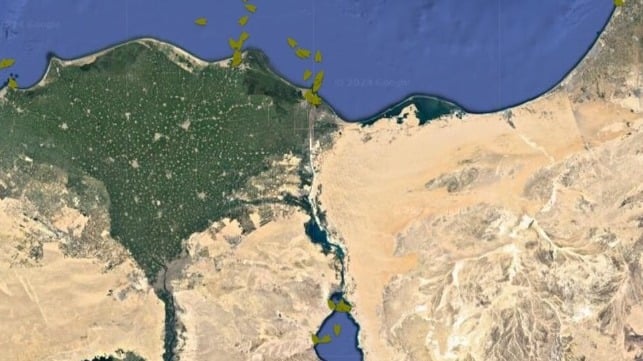Red Sea Disruption Takes a Toll on Egypt's Finances

Egypt's economy may soon be feeling the pinch from the security situation in the Red Sea, which has dramatically reduced traffic through the Suez Canal.
The waterway is a vital, reliable source of income, and it has increased in importance since the recent two-lane expansion program boosted transit capacity. In 2022-23 - with tanker traffic soaring due to the war in Ukraine - transit fees approached $9 billion, accounting for about two percent of Egypt's GDP. Egypt's government uses these dollars to service its $165 billion in public debt (among other purposes).
However, the attacks that Yemen's Houthi rebels have launched on international shipping have reduced canal traffic radically, and revenue with it. Almost all large container ships are now re-routing around the Cape of Good Hope because of the security threat, along with an increasing percentage of bulker and tanker traffic. According to Suez Canal Authority chairman Osama Rabie, canal transits are down by 30 percent year-on-year and dollar revenues from canal fees are down by 40 percent.
The canal's fee structure is part of the equation for shipowners when deciding to divert, according to Paul Tourret of French maritime institute ISEMAR. By skipping the canal and sailing around Africa, the ship saves enough on canal fees to offset the extra cost of fuel, and the longer trip "ends up being about the same price" overall, he told AFP.
An increasing number of owners are reaching this decision, and it is putting a large dent in Egypt's public finances. Egypt has to come up with $29 billion to service its external debts in 2024, according to the nation's central bank. This is unusually high, and it reflects a large volume of debt principal repayments coming due this year.

that matters most
Get the latest maritime news delivered to your inbox daily.
The disruption comes just at the same time that the war in neighboring Gaza has cut into Egypt's tourism revenue. Tourism is the nation's other major foreign-exchange earner for Egypt, and generates as much as $12 billion in a good year.
Though the Suez disruption is having a material effect on Egypt's sovereign income, its government has not publicly criticized Yemen's Houthi rebels for their actions in the Red Sea. Egypt's navy, the largest in the Arab world, is not a prominent part of the international presence near Bab el-Mandeb.
